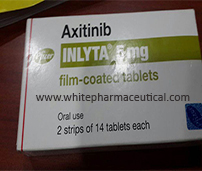Inlyta Tablets
Inlyta (axitinib) interferes with the growth of some cancer cells.
Inlyta is used to treat advanced kidney cancer.
Inlyta is usually given after other cancer medicine has been tried without success.
Take Inlyta exactly as prescribed by your doctor. Follow all directions on your prescription label. Your doctor may occasionally change your dose to make sure you get the best results. Do not take this medicine in larger or smaller amounts or for longer than recommended.
Inlyta should be taken at evenly spaced intervals, usually once every 12 hours. Follow your doctor's instructions.
Take this medicine with a full glass of water. You may take Inlyta with or without food.
Do not crush, chew, or break the tablet. Swallow it whole.
Your blood pressure will need to be checked often. You may also need frequent medical tests to be sure this medicine is not causing harmful effects.
If you need surgery, tell the surgeon ahead of time that you are using this medicine. You will need to stop using the medicine at least 24 hours before a planned surgery.
Store at room temperature away from moisture and heat.
Should not be consumed without asking the doctor if the patient ever had liver or kidney disease or pulmonary fibrosis (scarring of the lungs). Not advised if the patient is allergic to the medicine or any of its constituents. Kindly inform the doctor instantly, if allergic reactions cause (closing of the throat, difficulty breathing & swelling of the lips, tongue, face, hives, liver problems, lung problems, severe nausea, eye problems, loss of appetite, vomiting or diarrhea during treatment are noticed.
Doctor consultation is advised for pregnant women or for those who are breast feeding their child
Also call your doctor at once if you have:
any unexpected pain or swelling, any wound that will not heal;
a light-headed feeling, like you might pass out;
chest pain or pressure, pain spreading to your jaw or shoulder, trouble breathing;
shortness of breath (even with mild exertion), swelling, rapid weight gain;
sudden vision loss, headache, confusion, thinking problems, seizure (convulsions);
easy bruising, unusual bleeding (nosebleeds, bleeding gums), heavy menstrual bleeding, or any other bleeding that will not stop;
signs of stomach bleeding--severe stomach pain, red or pink urine, bloody or tarry stools, coughing up blood or vomit that looks like coffee grounds;
symptoms of a blood clot--sudden numbness or weakness (especially on one side of the body), sudden severe headache, slurred speech, problems with vision or balance;
signs of a blood clot in your leg--pain, swelling, warmth, or redness in one or both legs;
signs of a thyroid problem--sudden weight gain or loss, feeling very weak or tired, muscle pain, feeling hot or cold, hair loss, changes in your menstrual periods, hoarse or deepened voice; or
dangerously high blood pressure-severe headache, blurred vision, buzzing in your ears, anxiety, shortness of breath, uneven heartbeats.
Common Inlyta side effects may include:
nausea, vomiting, diarrhea, constipation;
rash, blisters, oozing, or severe pain in the palms of your hands or the soles of your feet;
increased blood pressure;
weakness, tired feeling;
decreased appetite, weight loss; or
hoarse voice.
